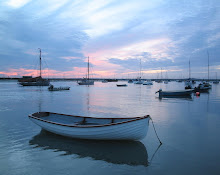
One of the books which I read in this way over Christmas – lent to me by my brother-in-law (who hails from North of the Border) - was Bill Duncan’s The Wee Book of Calvin. Which is a strange and surprising little volume, whose appearance entirely belies its contents. And this is intentional, as Duncan explains in his Introduction:
'This project started life as a mischievous, ironic take on the plague of ‘Little Book’ publications: you know, the sort of irritatingly positive-looking things that infest the ever-expanding ‘Mind and Body’ section of your local bookstore. Those bland, emotionally glib ‘New Age’, touchy-feely self-help guides . . . offering an instant path to inner peace, the child within and off-the-shelf spiritual enlightenment. And all this, without anything as painful as though, hard ideas or intellectual effort . . . I looked with mounting incredulity and dismay at the promiscuous glut of Little Books . . . Faced with this loathsome onslaught, I was convinced the world needed to hear a different kind of voice . . .’
The voice Duncan presents is the voice of the Kingdom of Fife in the East of Scotland. Here he has collected together aphorisms which sum up the Calvinist outlook of those who toiled for generations in the mines in a cold, grey landscape, or fished in the cold, grey sea.
'This project started life as a mischievous, ironic take on the plague of ‘Little Book’ publications: you know, the sort of irritatingly positive-looking things that infest the ever-expanding ‘Mind and Body’ section of your local bookstore. Those bland, emotionally glib ‘New Age’, touchy-feely self-help guides . . . offering an instant path to inner peace, the child within and off-the-shelf spiritual enlightenment. And all this, without anything as painful as though, hard ideas or intellectual effort . . . I looked with mounting incredulity and dismay at the promiscuous glut of Little Books . . . Faced with this loathsome onslaught, I was convinced the world needed to hear a different kind of voice . . .’
The voice Duncan presents is the voice of the Kingdom of Fife in the East of Scotland. Here he has collected together aphorisms which sum up the Calvinist outlook of those who toiled for generations in the mines in a cold, grey landscape, or fished in the cold, grey sea.
Hope is the dream o a foolish man.
If it didnae hurt, it wiznae worth daaein.
A glower says mair than a smile.
Dinnae expect onything an yell no be disappointed.
Hang a thief when he’s young an he’ll no steal when he’s aald.
If it didnae hurt, it wiznae worth daaein.
A glower says mair than a smile.
Dinnae expect onything an yell no be disappointed.
Hang a thief when he’s young an he’ll no steal when he’s aald.
and one which distills the essence of all the rest:
First braith, beginnin o yer daith.
Yet, as Duncan explains in his first essay (which you can read here), the more he pondered these snippets of wisdom, the more he felt the need to put them in context, and here’s what makes this book so much more interesting than it would at first appear.
The doom-laden ‘sayings’ are interspersed with a series of beautifully written autobiographical essays, recounting the author’s childhood life with his grandparents. His grim, sour, stoical grandmother – a staunch Presbyterian, whose world revolved around the themes of Salvation, Damnation and Redemption - and his courageous, whisky-sustained grandfather, who, to his wife’s eternal shame and anguish, was an Unbeliever.
‘From my Grandfather I inherited my love of black clothes, silence, haar, November, cloud formations . . . the sudden lash of rain against a window . . . the first skein of geese arriving across a darkening late-September sky heralding another Winter.’
The book persists with it's 'little book' theme and ends with a rather silly 'quiz', so readers can discover whether they are in fact closet Calvinists: 'You write only in black ink'; 'you feel suddenly and unaccountably sad during moments of pleasure or relaxation with friends'; 'You prefer your own company to that of others'; 'Your favourite confectionery product is Fisherman's Friend - Extra Strong', and so on and slightly tediously so on. Which makes the 'irony' of the enterprise rather too heavy-handed and I wondered whether it was the publishers, rather than the author, who ploughed on with this aspect of the book. (Oh, and it has an entirely hideous cover, which similarly fails to be ironic and indeed inclines one to read this surreptitiously hidden behind another book!)
But the musings on themes of belief and unbelief, climatic and human coldness, and above all the infinitely complex relationship between landscape and language, weather and linguistics are not only completely fascinating but so moving and poetic that I decided to find out more about Duncan.
He is a writer, poet and teacher, now based in Dundee. His collection of short stories, The Smiling School for Calvinists, was shortlisted in the 2002 ‘State of the Nation’ quest for the books which say the most about contemporary England, Wales, Northern Ireland and Scotland. An extract from Duncan’s essay in the book Scottishness - a collection of essays on national identity - can be read here .

And, in one of those pleasing bits of circularity in life, I also discovered that Bill Duncan paired up with another of my (relatively) recent ‘lucky finds’ - singer/songwriter, James Yorkston, on the Ballads of the Book album (the project has its own website , which takes an inordinate amount of time to load, and is almost worth the wait).
If you’re not familiar with James Yorkston – here he is singing ‘Steady As She Goes’ – accompanied by a quirky but rather lovely video.
If you’re not familiar with James Yorkston – here he is singing ‘Steady As She Goes’ – accompanied by a quirky but rather lovely video.





















No comments:
Post a Comment